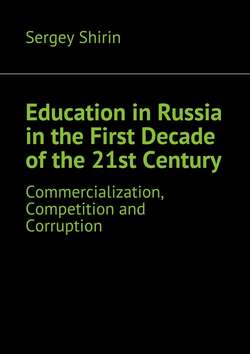Education in Russia in the First Decade of the 21st Century

Реклама. ООО «ЛитРес», ИНН: 7719571260.
Оглавление
Сергей Ширин. Education in Russia in the First Decade of the 21st Century
Introduction
Part 1. Competition law in education
Part 2. Commercialisation in education case law on fair trading
Part 3. Liberalization of the education market
Part 4. Liberalization versus standardization as a means of controlling higher education
Part 5. Corruption in education
I. What is the definition(s) of corruption
II. Where does corruption occur in education?
III. What can be done to hold those responsible accountable?
Conclusion
Отрывок из книги
The new law “On education in Russian Federation” that was adopted in December 2012 is considered by public opinion and by some experts as the law on commercialization of education which is directed against the excessive governmental control. Such control might result in violation of competition rights in educational processes and relations. Under contemporary circumstances, an urgent academic issue is the question of competition in Russian education system which is on the world Top-20. Does the new legislation bring any novelties into this field? To answer this question, we need first of all to understand to what extent Russian education had been corrupted before the new legislation started to be worked on.
Some scholars have already done their research of some aspects of this problem. E.G. Popkova, V.V. Chashchin, and D.V. Bogdanov point out that the amplification of the requirements for quality and level of education of the labor force leads to the formation of modern mechanisms of interaction between the labor market and educational services, which is put into practice in personnel marketing, which fundamental task is the creation of an attractive image of an enterprise, as an employer, to ensure its human resources activities with optimal quantity and quality. M. Esyutina, C. Fearon, and N. Leatherbarrow highlight some of the quality issues associated with the Bologna process and reflect on how the statements underpin quality of learning and mobility in a European higher education area context. They explore some of the issues raised from the documentation and examine some early experiences and challenges from a leading Russian university as part of a wider examination of higher education in a Russian context. M. Luk’Ianenko, O. Polezhaev, and N. Churliaeva explain that engineering education in Russia is undergoing reforms, but the history of this form of higher education does not indicate that it will succeed in bringing it into line with current world standards, or even making it more able to contribute at a high level to Russian economic growth. Some aspects of Russian educational policy are mentioned in the publications devoted to the whole spectrum of cultural policy or to foreign cultural policy of Russia. But there are almost no works specially devoted to the issue of competition in Russian educational market yet, except some social and demographic aspects. Academic discourse provides us with no specific conclusions about the extent of competition in educational market in Russia under the circumstances of the former educational legislation and in the common European context.
.....
3. Please describe other activities provided by educational institutions and their qualification as (public) services or otherwise?
In addition to the purely educational activities, educational institutions in Russia carry out research and development work, library science, publishing and printing activities, they are involved in organizing recreational activities, including theatrical shows, sporting, cultural, educational, and recreational and holiday events, etc. Educational institutions may also have non-commercial educational enterprises for students doing industrial practical work. All this kinds of activities are considered as non-commercial ones only if received income is reinvested in the educational process of the institution, and if such activities are stipulated by the institutions’ charters (clause 3, Article 47 of the RF Law “On Education”).
.....